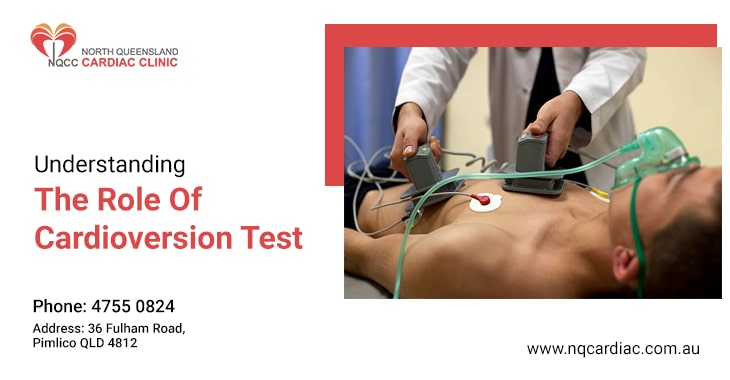As one of the Top Cardioversion Test Clinic Pimlico, North Queensland Cardiac Clinic provides state-of-the-art cardiac care to its patients. One of the essential procedures offered at the clinic is Cardioversion Test In Pimlico, a medical intervention used to restore normal heart rhythm in individuals suffering from certain heart rhythm disorders. This blog will explore the conditions it addresses and when this test is recommended.
- What is Cardioversion?
- Conditions that Cardioversion Addresses
- When is Cardioversion Recommended?
- Types of Cardioversion
What is Cardioversion?
Cardioversion is a medical procedure that aims to restore the heart’s normal rhythm in patients experiencing specific types of abnormal heart rhythms, also known as arrhythmias. During this procedure, an electrical shock is delivered to the heart, which helps to reset its electrical signals, allowing it to return to a regular rhythm.
Conditions that Cardioversion Addresses:
Cardioversion Test In Pimlico is primarily employed to treat two main types of arrhythmias: atrial fibrillation and atrial flutter.
Atrial Fibrillation (AFib): AFib is the most common type of arrhythmia, characterized by irregular and rapid electrical signals in the heart’s upper chambers (atria). This can lead to inefficient blood pumping and an increased risk of blood clots, stroke, and heart failure.
Atrial Flutter: Atrial flutter is another arrhythmia that causes the heart’s atria to beat rapidly, but more regularly than in AFib. Like AFib, it can also lead to complications such as blood clots and reduced cardiac output.
When is Cardioversion Recommended?
At the North Queensland Cardiac Clinic, Top Cardioversion Test Clinic Pimlico, the decision to recommend cardioversion depends on several factors, including the patient’s medical history, the duration and type of arrhythmia, and overall health status. Typically, cardioversion is considered when:
New-Onset Arrhythmias: Cardioversion may be considered if a patient experiences atrial fibrillation or atrial flutter for the first time. In addition, the arrhythmia has not spontaneously resolved within 48 hours.
Chronic Arrhythmias: In cases where arrhythmias are recurrent or persistent and other medical treatments have not successfully controlled the condition, cardioversion may be recommended.
Symptomatic Patients: If the arrhythmia causes troubling symptoms like palpitations, shortness of breath, dizziness, or chest pain, cardioversion may be considered to alleviate these discomforts and improve the patient’s quality of life.
Preparation for Other Procedures: In some cases, cardioversion may be used as a preparatory step before other heart procedures, such as ablation therapy.
Types of Cardioversion:
- Electrical Cardioversion
- Chemical Cardioversion
Electrical Cardioversion:
In this form of cardioversion, an external defibrillator delivers a precisely controlled electrical shock to the chest. The shock helps to reset the heart’s electrical signals and restore normal rhythm. This procedure is typically performed under conscious sedation to minimize discomfort.
Chemical Cardioversion:
This type of cardioversion involves the administration of anti-arrhythmic medications to restore normal heart rhythm. While less invasive, it may take longer for the medication to take effect, and there is no guarantee of success.
Final Words
The North Queensland Cardiac Clinic, Top Cardioversion Test Clinic Pimlico is dedicated to providing the highest standard of care for patients with heart rhythm disorders. If you or a loved one are experiencing heart rhythm irregularities, consult with our experienced team of cardiac specialists. They will help determine if Cardioversion Test In Pimlico is the right treatment option for you. Remember, early diagnosis and timely intervention can make a difference. You can then maintain a healthy heart and a better quality of life.


